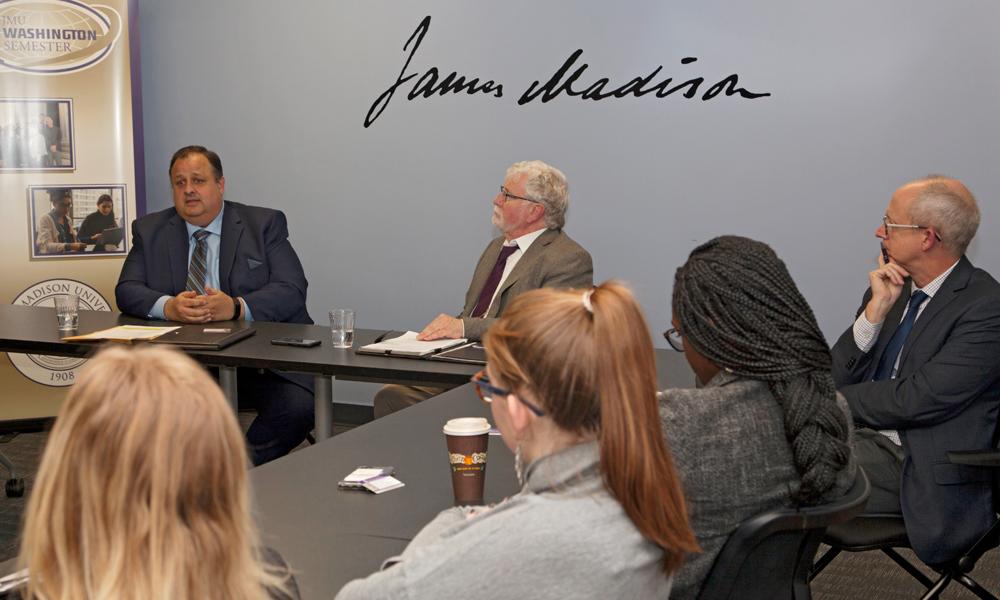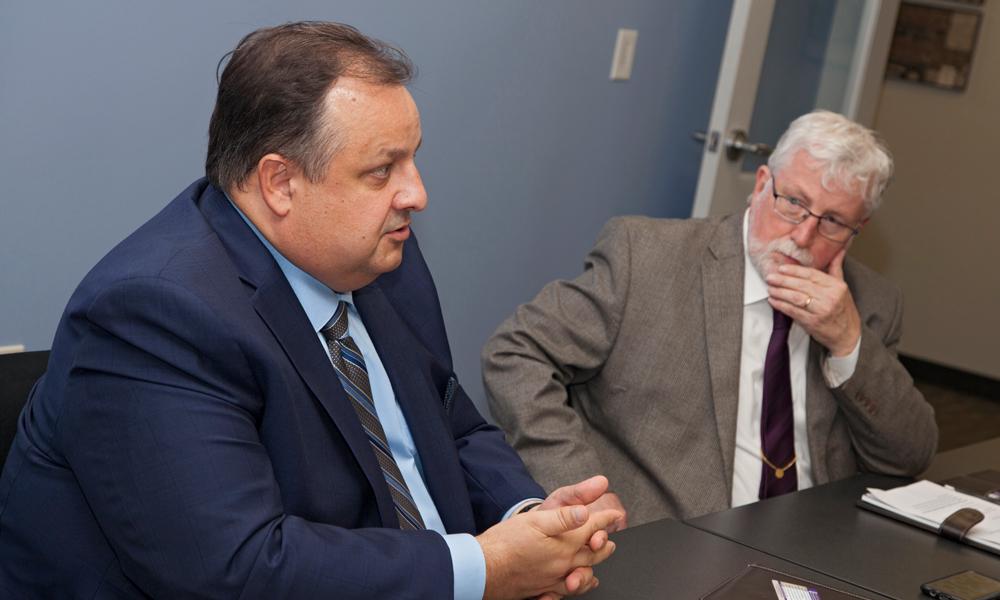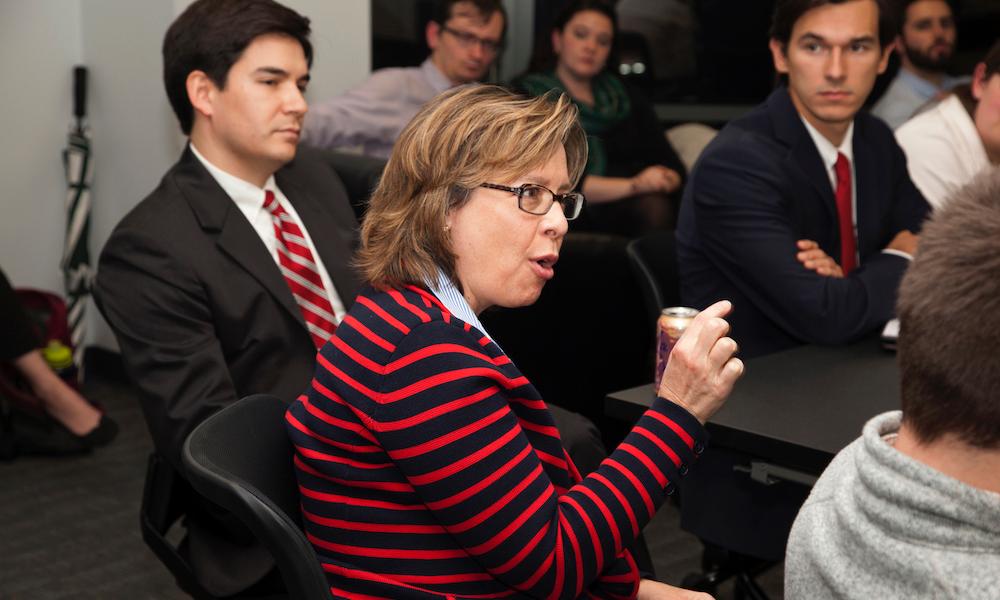Alumnus calls for government ethics reform
JMU Headlines
SUMMARY: The Oct. 17 event “Restoring Government Ethics: A Conversation with Walter Shaub” featured the former director of the Office of Government Ethics speaking with current Washington Semester students and area alumni.
By Jim Heffernan (’96, ’17M)
Walter Shaub (’93), the former director of the Office of Government Ethics who famously called out then-President-elect Donald Trump for his reluctance to turn over control of his business interests, spoke of the need for government ethics reform Oct. 17 at the JMU Washington Center.
Shaub urged the audience, which included Washington Semester students interested in careers in public service, to consider their own values and maintain “a kernel of skepticism” in the workplace because, he said, “even the best people make bad decisions.”
Recent high-profile examples span both Republican and Democratic administrations, Shaub said. During the George W. Bush presidency, The New York Times uncovered a scandal involving regulators in the Department of the Interior who engaged in illicit drug use at industry functions as well as sexual relationships with oil and gas company executives. In 2013, during the Obama administration, members of the Secret Service were implicated in a night of drinking and prostitution during the president's trip to Colombia.
Most ethical lapses in government are far more discreet, Shaub said, from backdating forms to awarding contracts to misusing funds.
“When you go into a new work environment,” Shaub told students, “picture yourself as an explorer, like you’ve landed on another planet. You’re in your space suit … and you’re surrounded by this atmosphere that’s different than what you’re used to.
“There needs to be this little part of you—call it 1%, 5%, if it’s a really unhealthy office, 25%—that makes you say, ‘I need to stop and analyze whether the things we’re doing are consistent with my values and what I want to do,’” he said.
If those values are in conflict, he said, federal employees should not be afraid to request another assignment or leave the organization.
“Restoring Government Ethics: A Conversation with Walter Shaub” was moderated by Bill Hawk, who chairs JMU’s Ethical Reasoning in Action initiative. Audience members received cards with the Eight Key Questions students are encouraged to consider before making important decisions in their personal, professional and civic lives.
“I wish we had these when I was at JMU,” Shaub said. “The questions are terrific, but what matters more than the questions themselves is that they get asked.”

|
The Office of Government Ethics is charged with establishing standards of conduct for members of the executive branch, ensuring transparency in government through financial disclosure and training executive branch employees. As an independent agency, OGE’s work is apolitical, Shaub said, and it lacks the power of enforcement. “Its primary role is to be a mechanism of prevention,” he said.
Shaub said the office enjoyed support from the Bush and Obama presidencies, but in working with the Trump transition team in late 2016, “It was already clear that this was the anything-goes team.”
On Jan. 11, 2017, nine days before Trump’s inauguration, Shaub delivered a speech at the Brookings Institution in which he sharply criticized the real estate mogul’s plan to transfer his business interests to two of his sons rather than place them in a “blind” trust, as is customary for incoming presidents.
“As an ethics attorney having spent the last decade and a half working with presidential nominees and others, I knew firsthand what a conflict of interest was,” Shaub told the audience at the Washington Center. “I thought it was imperative to speak up.”
When Trump ultimately decided to keep with tradition and divest his holdings, Shaub took to Twitter, mimicking the president-elect’s messaging style and congratulating him on making the right decision. The tweet put the director and his little-known office in the national spotlight.
“I’m not ashamed to admit, I was terrified,” Shaub told the audience. “I found myself asking, ‘How do I get out of this?’ I had spent my entire career as an ethics official thinking the goal is to stay out of the news. … I assumed I would be fired at 12:01 [a.m.] on Jan. 20.”
As it turns out, he wasn’t. But following a series of disputes with members of the Trump administration, Shaub resigned from his position in protest in July 2017.
“I felt like I had no choice,” he said, “and it broke my heart because I had been in government almost all my entire career.”

|
Shaub now works for the nonprofit Citizens for Responsibility and Ethics in Washington, which aims to reduce the influence of money in politics and hold government officials accountable through aggressive legal action and public information campaigns.
“We have entrusted public officials with great power to use for our benefit, not theirs,” he said.
Asked about how to achieve ethics reform, Shaub said more education and training is needed, along with new laws to close loopholes. “But laws aren’t enough,” he said. “Norms are just as important and some of them you just can’t legislate.”
In order to deter bad behavior, he said, hit the perpetrators where it hurts—in their wallets. Stiff civil and administrative penalties are more likely to be effective than criminal prosecutions, which at times, he said, the Department of Justice has been unwilling to litigate.
Shaub believes in public service. During his talk, he held up the Samuel J. Heyman Service to America Medals program—known in government circles as the “Sammies”—as an example of the positive impact federal employees can have.
“You get to go to work each day feeling like you’re working for the good guys and helping your country,” he said.
